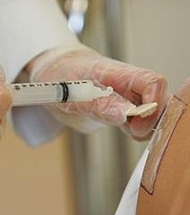New clinical trials of Disitertide (P144) in patients with scleroderma
This molecule, patented by CIMA, has been found to improve the skin of people suffering from this chronic disease

The companies DIGNA Biotech and ISDIN are starting a new clinical trial of Disitertide (P144) in order to further the development of this product for use with patients who have scleroderma or systemic sclerosis. This ointment has recently been found to bring about statistically significant subjective improvement of the area treated, in a phase-2 clinical trial carried out in 17 hospitals in Spain, Germany, the United Kingdom, Poland, Hungary and Italy. After three months of treatment, 42% reported improvement in the arm that was treated using Disitertide. Moreover, no severe side effects were reported in relation to the treatment. DIGNA Biotech had already had the product declared an "orphan drug" for the treatment of systemic sclerosis in Europe and the USA. The substance consists of a molecule (P144) patented by the Center for Applied Medical Research (CIMA) at the University of Navarra.
In the words of Dr. Pablo Ortiz, managing director of DIGNA Biotech, "for the first time, a TGF-β1 blocker applied topically, as in the case of Disitertide, has brought about a sign of subjective improvement in patients with systemic sclerosis. This is particularly important, because we may be looking at the first member of a new family of drugs". Juan Naya, managing director of ISDIN, added that "these results encourage us to carry on investing in this project, to move towards the market, so that when the time comes, we can bring about a substantial improvement in the quality of life of patients with systemic sclerosis".
A chronic diseaseSystemic sclerosis is a chronic disease characterized by fibrosis in the skin, blood vessels and internal organs such as the lungs. At present there is no cure for this disease, and the treatment available for the symptoms is not particularly effective.
Disitertide is a TGF- β1 blocker, that is, it acts against one of the key factors responsible for the disease. At the same time, DIGNA Biotech is researching into potential applications of this product for use against conditions such as heart fibrosis, fibrosis arising from the implantation of a foreign body such as silicone, macular degeneration of the retina, and melanoma. In all these cases, the company already has proof of a positive response in animal models.
